Living with congestive heart failure (CHF) can feel overwhelming, especially in the early days when the diagnosis is new and the next steps feel uncertain.
But whether you just found out you have CHF or you’ve managed it for a while now, one of the most powerful steps you can take for your heart and overall health is to follow a congestive heart failure diet.
What you eat directly impacts your body, particularly your heart. By choosing foods that support heart function and avoiding those that strain it, you can help manage symptoms, lighten the load on your heart, and even slow the progression of CHF.
Why Diet Matters for Congestive Heart Failure
Congestive heart failure occurs when the heart can no longer pump blood as efficiently as it should. As a result, you’re likely to experience fluid buildup in the body, chronic fatigue, and shortness of breath, among other symptoms.
However,
- Low-sodium foods lower the risk of fluid buildup and swelling in the body.
- Nutrient-rich foods help lower blood pressure, causing less strain on the heart and promoting better heart function.
- Low-calorie, nutrient-dense foods help you manage or reduce excess weight, lowering your heart’s daily workload.
- Heart-healthy foods deliver the vitamins, minerals, and antioxidants your heart needs to thrive and perform at its best, even if you have congestive heart failure.
Simply put, a diet centered around your congestive heart failure can improve your symptoms, increase your energy levels, and lead to positive and long-term outcomes.
Goals to Aim for Through a Congestive Heart Failure Diet
- Sodium reduction (generally to less than 2,000 mg/day, or as prescribed by your doctor).
- Fluid control, if recommended by your cardiologist.
- Increase of nutrient-dense foods that support cardiovascular health.
- Reduction of sugars and unhealthy fats that increase strain on the heart.
- Balanced portion sizes to maintain a healthy weight.
Foods to Eat With Congestive Heart Failure
1. Fresh Fruits and Vegetables
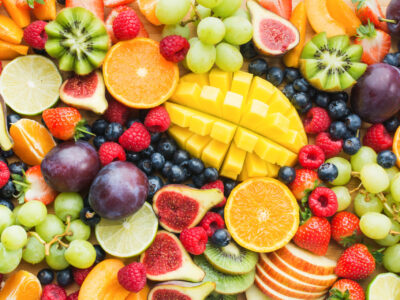
Fresh produce is naturally rich in vitamins, minerals, and antioxidants that help reduce inflammation and support overall heart function. Aim for a variety of colors on your plate.
Great fruits:
- Berries and aggregates (Bananas, grapes, strawberries, blueberries, raspberries, blackberries, etc.)
- Melons (watermelon, cantaloupe, honeydew, etc.)
- Citrus (Orange, grapefruit, lemon, lime, etc.)
- Pomes (apples, pears, etc.)
- Stonefruits (peaches, plums, nectarines, cherries, mangos, dates, etc.)
- Multiple (pineapple, fig, mulberry, etc.)
When preparing your fruits or ordering them at a restaurant, avoid fruits that have been baked in added sugar, flash-fried, or prepared in similar ways. Instead, opt for fresh fruits for the most nutrients.
Great vegetables:
- Cruciferous (broccoli, kale, cauliflower, cabbage, Brussels sprouts, etc.)
- Leafy (spinach, arugula, lettuce, collard greens, mustard greens, etc.)
- Root (potatoes, carrots, beets, onions, garlic, etc.)
- Gourd (zucchini, squashes, etc.)
- Fruit (tomatoes, peppers, cucumbers, eggplant, okra, avocado, etc.)
- Legume (Beans, peas, lentils, etc.)
- Stem (asparagus, celery, rhubarb, etc.)
When preparing your veggies or ordering them at a restaurant, do not opt for veggies that have been fried, cooked in lots of oil, or cooked in a pot with fatty meats. Go for steamed, roasted, or raw veggies for the healthiest option.
2. Whole Grains
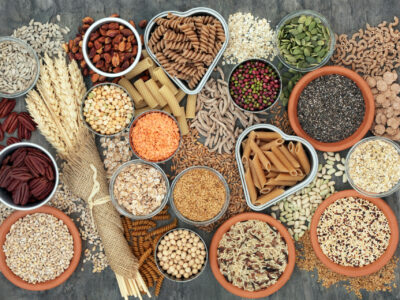 Whole grains are high in fiber, which can help control cholesterol and blood sugar levels.
Whole grains are high in fiber, which can help control cholesterol and blood sugar levels.
Great grains:
- Brown rice
- Quinoa
- Oats
- Corn
- Barley
- Rye
- Buckwheat
- Farro
- Bulgar
- Whole-wheat breads
- Whole-wheat pasta
3. Nuts and Seeds
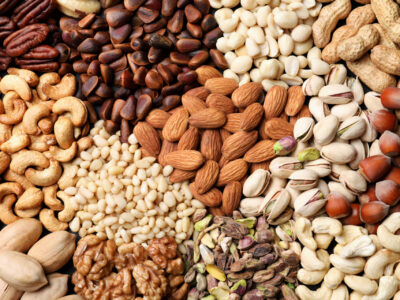 Nuts and seeds offer plenty of healthy fats, fiber, and other vitamins, minerals, and antioxidants that your heart needs to thrive.
Nuts and seeds offer plenty of healthy fats, fiber, and other vitamins, minerals, and antioxidants that your heart needs to thrive.
Great nut and seed options:
- Almonds
- Walnuts
- Brazil nuts
- Pecans
- Pistachios
- Flaxseeds
- Chia seeds
- Pumpkin seeds
When snacking or incorporating nuts and seeds into recipes, keep portions in mind. In addition to being rich in nutrients, nuts and seeds are also high in calories.
4. Lean Protein Sources
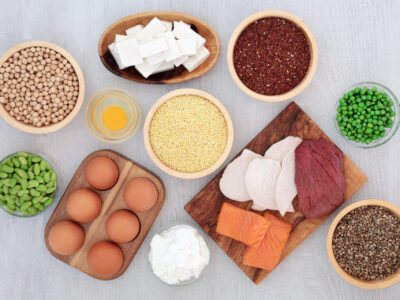 Protein is essential for maintaining muscle strength and supporting organs, including the heart. Choose protein options that are low in saturated fat.
Protein is essential for maintaining muscle strength and supporting organs, including the heart. Choose protein options that are low in saturated fat.
Great protein sources:
- Chicken
- Turkey
- Fish
- Shellfish
- Tofu
- Eggs
- Beans
- Lentils
When preparing your protein or ordering it at a restaurant, avoid options that have been battered and fried or cooked in too much butter or oil. Instead, choose options that have been grilled, roasted, baked, stewed, sautéed, or prepared using another more heart-friendly method.
Also, minimize your intake of red meat, including pork, as it is typically higher in saturated fat and cholesterol.
5. Fatty Fish and Lean Fish
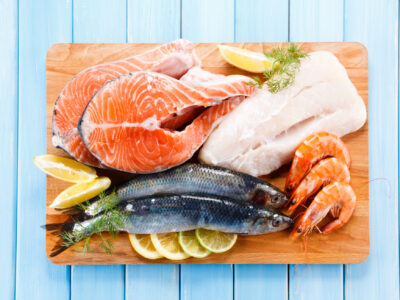 Many fish varieties are rich in omega-3 fatty acids, which reduce inflammation and support heart health. Incorporate more fish (both fatty and lean) into your diet to maximize these benefits.
Many fish varieties are rich in omega-3 fatty acids, which reduce inflammation and support heart health. Incorporate more fish (both fatty and lean) into your diet to maximize these benefits.
Great fatty fish options:
- Salmon
- Tuna
- Sardines
- Mackerel
- Trout
- Sea bass
Other lean fish options:
- Cod
- Tilapia
- Shrimp
- Scallops
- Oysters
When preparing your fish or ordering it at a restaurant, avoid those that have been battered and fried or cooked in too much butter or oil. Instead, choose options that have been grilled, roasted, baked, stewed, sautéed, or prepared using another more heart-friendly method.
6. Low-Fat Dairy or Dairy-Free Alternatives
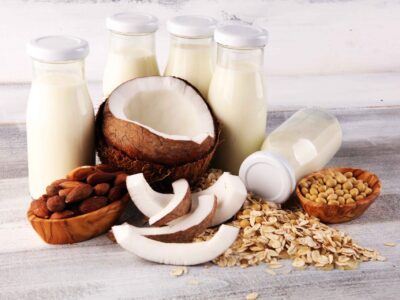 Calcium and vitamin D are important, but full-fat dairy can be high in saturated fat. Opt for dairy that is low in fat but still rich in other nutrients. Or, if you’re someone who does not do well with dairy, opt for dairy-free alternatives.
Calcium and vitamin D are important, but full-fat dairy can be high in saturated fat. Opt for dairy that is low in fat but still rich in other nutrients. Or, if you’re someone who does not do well with dairy, opt for dairy-free alternatives.
Great dairy and dairy-free options:
- Skim milk
- Low-fat yogurt
- Unsweetened almond milk
- Unsweetened soy milk
7. Healthy Oils
 Not all fat sources are unhealthy. Rather than cooking with butter or lard, reach for any of the healthy oils you can use when cooking or preparing meals.
Not all fat sources are unhealthy. Rather than cooking with butter or lard, reach for any of the healthy oils you can use when cooking or preparing meals.
Great oil options:
- Olive oil
- Avocado oil
- Coconut oil
- Sesame oil
- Flaxseed oil
- Walnut oil
Foods to Avoid With Congestive Heart Failure
1. High-Sodium Foods
Excess sodium makes your body hold onto fluid, increasing swelling and blood pressure.
Limit or avoid:
- Processed meats (bacon, ham, sausages, deli slices, canned meats, jerky, etc.)
- Canned soups
- Frozen dinners
- Salty snacks (potato chips, crackers, bagged popcorn, etc.)
- Fast food
- Pickles
- Soy sauce
2. Excessive Fluids
Depending on your stage of congestive heart failure, your doctor may recommend limiting fluids to prevent fluid overload. Talk with your doctor about what a limited-fluid diet should look like for you.
3. Sugary Foods and Drinks
Added sugar adds empty calories to your meal, contributes to weight gain, and is likely to worsen blood sugar control. Reducing or cutting out added sugar altogether can do wonders for your heart and overall health.
Avoid:
- Sodas
- Juices
- Energy drinks and sports drinks
- Candies
- Pastries
- Ice cream
- Sweetened cereals
- Sweetened yogurt
- Granola bars
- Certain sauces
4. Saturated and Trans Fats
Saturated and trans fats raise cholesterol and harm your cardiovascular system. Replacing them with healthier fats is your best option.
Limit or cut out:
- Red meats
- Processed meats
- Fried foods
- Butter
- Shortening
- Processed foods
- Canola oil
- Vegetable oils (soybean oil, sunflower oil, grapeseed oil, etc.)
5. Alcohol
Alcohol can add to the weakening of the heart muscle and interfere with your medications. When it comes to alcohol intake, talk with your doctor about its effect on you. If necessary, create a plan to reduce or cut it out altogether.
Practical Tips for Adopting a Congestive Heart Failure Diet
Changing your diet for the good of your heart can seem overwhelming at first, but it doesn’t have to be stressful or feel too hard. Check out these helpful tips to make the adjustment easier:
- Prioritize single ingredients: Choose fruits, veggies, lean meats, nuts, seeds, etc. over food products with many ingredients and preservatives.
- Prioritize whole foods: Choose fruits, veggies, lean meats, nuts, seeds, etc. over processed food products.
- Read labels: Check for sodium content, especially in packaged and canned foods.
- Cook at home: Prepare your meals for total control over your ingredients.
- Use herbs and spices: Flavor food with garlic, basil, lemon juice, or pepper instead of salt.
- Plan meals: Prepare your meals ahead of time to avoid last-minute unhealthy choices.
- Watch portion sizes: Pay attention, because even healthy foods can contribute to weight gain if eaten in excess.
- Snack smart: Choose fruit, unsalted nuts, or veggie sticks instead of chips or sweets.
- Stay consistent: Strive to create a lifestyle change with your diet to see the long-term benefits.
If you have been diagnosed with congestive heart failure or suspect something is wrong with your heart, turn to the compassionate cardiologists at Middle Georgia Heart.
Our heart doctors are highly experienced in caring for patients diagnosed with CHF. We provide the most effective care through diligent management and patient-centered treatment plans to help you live as fulfilling a life as possible, regardless of your CHF diagnosis.
Schedule a consultation with us today: 478-207-5224
Recent Articles
